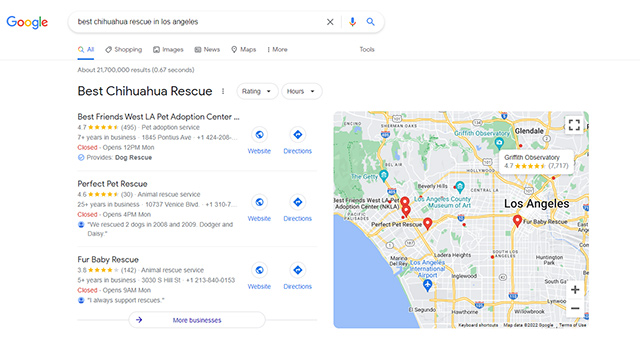Looking for Small Dogs for Adoption? These Types Of Shelters Can Help

If the perfect pooch of your dreams is more pocket-sized rather than a polo pony, you’re not alone.
According to the American Kennel Club (AKC), smaller breeds are more popular than their larger buddies, with more small breeds being registered every year than midsize or large breed dogs. In 2020, the smaller pups made up 6 of the top 10 breeds.
This is usually attributed to the following:
- Small dogs are easier to care for.
- Small dogs are usually safer for older people to own.
- Small dogs cost less to feed.
- The trend in downsizing means many no longer have the space for a larger dog.
- Small breeds live longer than both mid-sized and large breeds.
Maybe your budget would be stretched by feeding Goliath the Great Dane. Or your apartment isn’t that big. Or you’re concerned for your own health and safety. Perhaps you just want a canine companion that will be around for many years to come.
Whatever the case, thinking about small dogs for adoption may be the right choice for you. There are also plenty of small dogs that need rehoming, so you won’t have trouble finding a tiny pooch to adopt.
I love to see dogs of all shapes and sizes find their happy, healthy forever homes. For that to happen, though, you need to know where to go to find the perfect pooch to adopt.
In the case of small dogs for adoption, there are 4 types of shelters that can help. Today, we’re going to take a detailed look at all four of them. So sit, stay, and read on.
1. Small Dogs For Adoption: Breed Specialty Rescues
There are rescue organizations for just about every breed of dog imaginable. You can find rescues for every breed from Beagles to Basset Hounds to Bichons Frises. Everyone seems to have their favorite breed to work with and rescue.
If you know what specific type of small breed dog you want to adopt, the first place you may want to look is your closest rescue that specializes in that breed.
A Google search for “best (breed) rescue in (your city, state, or geographical region)” should bring up a few results. Here you can see the search for “best Chihuahua rescue in Los Angeles” I just did from my laptop. You’ll also come across groups dedicated to small dog rescue like the Small Breed Adoption and Rescue Network on Facebook, where you can connect with people around the country who can help you find the right resources, and discover adoptable dogs.

If I wanted to add a new little friend to our home pack, I could start with any of these results—or all of them, for that matter. I’d make a call, see what Chihuahuas I could visit, set up a time to see them, and go from there.
See also Sadly, Queen Elizabeth Can’t Walk Her Dogs Anymore
If your local search comes up empty, don’t despair. Widen your search to your whole state. If that doesn’t work, widen even further to a multi-state geographical region. It may mean some travel on your part, but your potential pooch is worth it, right?
But Rocky, what if I don’t know what small breed I want to adopt?
No worries there, either. You can always narrow down your choice with a little research. The AKC has a “Breed Explorer” where you can get all kinds of information on different dog breeds. Follow these steps to research the perfect small breed for you:
- Select Breeds A-Z in the navigation menu.
- In the drop-down menu that opens, click Explore by Characteristic or Group.
- Choose Smallest Dog Breeds.
- Once there, you can employ other filters on the left side of the screen such as size, shedding, activity level, and more.
Small dog rescue sites also are careful to list exactly how big their dogs are, instead of simply labeling them “small, medium, and large.” You can filter for small dogs under 10 pounds for adoption, or go larger and look for dogs under 30 pounds for adoption. If you spend the time to look, the right dog will come your way.
I’ve also got an article here on the 5 best small breeds for families with kids that I encourage you to check out.

2. Senior Dog Shelters
In the dog world, small breeds have the longest lifespans on average. A small dog can live 15 years or more. Yorkies, Chihuahuas, Lhasa Apsos, Toy Poodles, and Dachshunds have all been known to live for 20 years.
This often means that these dogs either outlive their owners or their owners’ lifestyles. Because of this, they tend to end up in shelters more frequently than many of their larger breed counterparts.
Adopting a senior dog can be a challenge, especially if they have health issues or other special needs. Some of the issues that can affect a senior dog are:
- Weight gain
- Muscle loss and lack of mobility
- Joint pain from arthritis
- Sight issues due to thickening of the lenses
- Less energy, more lethargy
- Canine dementia
- Hearing loss
- Gum disease and tooth loss
However, that doesn’t mean that you shouldn’t consider it. After all, older dogs can love just as much as younger ones can. Another benefit to adopting a senior dog is that they may not need as much training as a puppy.
There may be some bad habits to correct (and yes, you can teach old dogs new tricks) but potty training, leash training, crate training, and so on are often old hat to these senior citizens.
See also Rescue Dog has Unique ‘Picasso’ Face the reason will SURPRISE you!
Just what makes a dog a senior dog, you ask? The table below spells it out for you.
| Type of Dog | Age at Which They Become a Senior |
| Large breeds | 6 to 7 years old |
| Mid-sized breeds | 8 to 9 years old |
| Small breeds | 10 to 12 years old |
You know me—I love dogs of all ages and sizes, and I couldn’t resist doing a video with these elderly residents of Muttville in San Francisco, a senior dog shelter. They had arrived after one of our many California wildfires, and despite their age, were quite the lively bunch.
If you feel a senior dog is right for you and your home, search for any senior dog rescues in your area. The chart may say 10 years is “senior” to a small breed, but for those that live 15 or even 20 years, that’s just middle age, right?
3. Special Needs Shelters
Another place you’ll find small dogs for adoption is in special needs shelters.
Any and all dogs can become a special needs dog through neglect, age, an accident, an illness, or even just genetics. I’ve met two-legged Dalmatians and blind Labradors. Blind and deaf senior dogs, too.
Despite their challenges and “issues”, it’s hard to come across a special needs dog that isn’t just as happy to play, willing to be pampered and petted, and eager to chomp on a cookie as any “normal” pup.
That’s all just part of being a dog.
Which is why I encourage people to give a special needs dog that special place in their family and home.
After all, they can be just as adventurous, just as loving, and just as much fun as every other pupper out there. Don’t believe me? Check out this video of a two-legged dog.
Why are there so many special needs small dogs for adoption?
There are three main reasons why you’re likely to find smaller dogs in special needs shelters.
Smaller dogs are more fragile than their larger counterparts, and are often severely injured in falls and other accidents that a larger dog would shake off. This can lead to the loss of a leg or even paralysis.
See also Caged Bulldog Winston Finds Foster In The Nick Of Time
Small purebred dogs are often so inbred that birth defects like blindness, missing legs and deafness are common.
And then there’s the issue of their longevity. Many of the health issues common in senior dogs can create special needs in small dogs for adoption since they have such long lifespans.
That doesn’t mean that special needs senior dogs just sit around and soak up the sun on the sofa all day. Check out this article about an amazing blind and deaf senior from Australia.
4. Your Local No-Kill Shelter
It may not seem like the most obvious place to look for a small doggo, but don’t overlook your local Humane Society or other no-kill animal rescue shelter.
Small dogs for adoption and small breed dogs are no strangers to the situations that these shelters work to rescue animals from. Things like:
- Cosmetic and pharmaceutical product testing
- Abuse, hoarding, and neglect
- Dog fighting
- Homelessness and “strays”
- Puppy mills
Pocket-sized pooches are often the victims of surrendering, too, as they get older and their health issues become overwhelming to their owners.
So if a particular breed isn’t on your radar, or your concern is more with size than breed, your local shelter may be the way to go.
After all, the only thing these shelters specialize in is giving dogs a loving, safe environment until their perfect forever home can be found. You never know what, or who, you may meet there. I often meet the most interesting characters when visiting local shelters.
Your local shelter may also cost you less in adoption fees, allowing you to bring home your perfect pet more easily and affordably.
Some Last Words of Advice
As I said in the beginning, I’m all about seeing that every dog has the best life ever. To do that, I try to help you provide the best life for both you and your adopted dog. Therefore, I encourage you to check out the following resources here on my website:
- A checklist for prospective adoptive parents
- Are you ready to foster a dog? Take the quiz and find out. (This could expose you to senior and special needs dogs, as well as various small breeds, too.)
- Crate training your rescue dog
- Allergic? There are 55 hypoallergenic dog breeds that may help, including several small dog breeds.
May you and your pocket pooch have a happy, healthy, long life together. You both deserve it!
